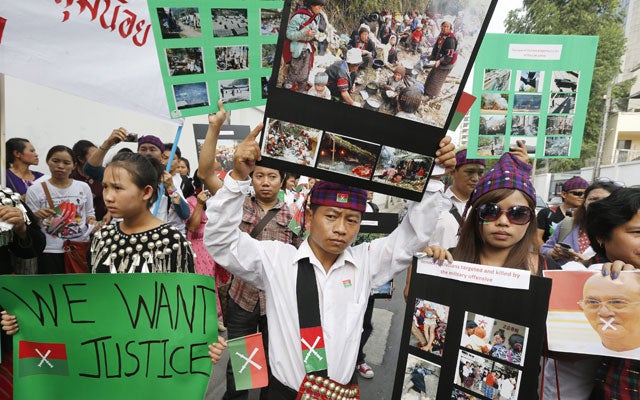Atrocities in Burma a Reminder of Human Rights Concerns
Olivia Enos /

Kachin protesters outside the Burma Embassy in Bangkok, Thailand. (Photo: Narong Sangnak/EPA/Newscom)
Over the past month, violence between the Burmese government and the Kachin, a small Christian minority group, has escalated. Just this week, three people were killed and at least four were wounded amid destruction that has displaced nearly 100,000.
The violence is the latest episode in the ongoing conflict since Burma in 2011 broke the cease-fire agreement that had held since 1994.
Since Burma and China signed their cross-border trade agreement in 1988, the Kachin landscape has suffered dearly from over-logging, mining, and excavation by government-sanctioned enterprise. By some analyses, the 1994 cease-fire was signed by the Burmese government only because the Chinese tied the government’s hands in an effort to expand Chinese entrepreneurial enterprises in the lush Kachin region.
The worst atrocities, however, have been against the Kachin people. Due to the authoritarian processes governing the development of infrastructure, harvesting of hydropower, and logging expeditions, thousands of Kachin have been displaced in their own homeland. The region has also seen the development of the sex industry, and many women and children who flee to China are trafficked into the sex trade to be used as prostitutes or sold as mail-order brides. Now, the Kachin’s misery is compounded by renewed war.
This latest conflict demonstrates that while Burma is making economic and developmental strides and achieving some political reform, human rights remain a serious problem. Political reforms are not irreversible so long as the current power structure enshrined by Burma’s constitution remains in place. In its rush to normalize relations, the U.S. should not deplete its leverage too quickly but should be very clear what constitutes cause for reinstituting sanctions—all of which remain on the books.
As Walter Lohman, director of The Heritage Foundation’s Asian Studies Center, has proposed: “Congress needs to step in and add the ‘stick’ back to a policy that has become all ‘carrot.’ It can do this by reasserting its historic role in Burma policy, setting concrete objectives, and clarifying the consequences of underperformance.”
